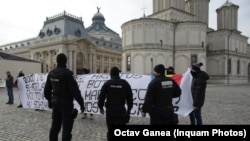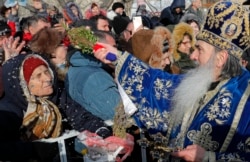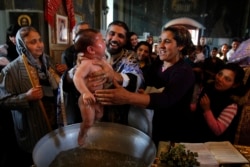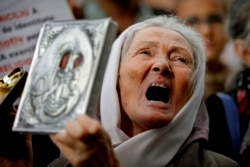Teodosie Petrescu, archbishop of the Romanian Orthodox Church’s Archdiocese of Tomis in southeastern Romania, denied responsibility for the death of a six-week-old baby boy who succumbed after being immersed under water three times during baptism.
“Indirectly, Teodosie blamed the parents for the baby's death, saying it could not have swallowed any water at all during the brief immersion, possibly the parents had ‘overfed’ the child that had then suffocated on its mother's milk,” Deutsche Welle reported on February 9.
Teodosie told Aleph News: “There is no way he could have swallowed a 100 ml of water from the gesture I saw. He died from choking on mother’s milk. His parents overfed him.”
That statement is false. Paramedics arrived and helped the infant cling to life. He died the next day in a hospital’s intensive care unit, and an autopsy found 100 milliliters (3.4 ounces) of water in his lungs. There is no evidence that he choked on mother’s milk.
Here is how local media reported the tragedy, which has sparked outrage in Romania.
On Sunday, January 31, an ambulance was called to a church in the Zamka neighborhood of the northern city of Suceava. Paramedics resuscitated a six-week-old baby boy after the priest had submerged the child three times in the baptismal font, in accordance with the Orthodox Christian ritual, the local news site Objectiv said.
“When the [paramedic] crew arrived at the place of worship, the newborn was in cardio-respiratory arrest and resuscitation maneuvers were needed. ‘He was intubated, aspirated, had a lot of water in his lungs,’ said the doctor who gave him first aid in shock, acknowledging that the little one was almost dead,” Objectiv reported.
Another Romanian media outlet, Antena3, reported that the child had spent the night on a ventilator in the Suceava County Hospital’s intensive care unit but died early that morning.
Antena3 reported that police have launched a criminal investigation and that the priest who performed the baptism was charged with manslaughter.
The priest has denied wrongdoing. But Ioan Bulboaca, a lawyer for the child’s parents, told Radio Free Europe/Radio Liberty: "The child was crying; he was put in the font with his face up, anyone would swallow water. This is a secondary (delayed) drowning. When he came out, he wasn't crying. It was a sound, like a cry for help, that's all he could do. …”
Justin’s death set off a national debate in Romania, where the Orthodox Church is one of the most powerful and influential institutions.
A Romanian teacher, Vladimir Dumitru, launched an online petition demanding that the Romanian Orthodox Church reform the christening ritual to make it “less brutal” and less dangerous for infants. So far, the petition has gained more than 65,000 signatures.
The Orthodox christening tradition requires three full immersions. The petition proposes a baptism by simply sprinkling holy water over the head of the baby.
The church, however, has rejected that proposal. On February 25, its decision-making body, the Holy Synod, announced that the ritual would not be changed or altered, citing its “statutory obligation … to remain in communion and dogmatic (doctrinal), liturgical (sacramental) and canonical (disciplinary) unity with the universal Orthodox Church.”
The synod said its decision was made to address “the discussions, concerns and misunderstandings that appeared in the public space on the topic of the Baptism of children with poor health.” At the same time, the synod urged priests to be more careful and that a pediatrician’s approval would be required for an infant christening.
News reports describe Teodosie, who is a member of the Holy Synod, as one of the harshest critics of the proposed baptismal reform. He said the petition is an effort to “intimidate” the church and claimed the baptismal font’s cold water is good for babies’ health.
The two-millennia-old canons of faith will remain intact, he proclaimed.
Teodosie is a controversial figure. According to the Romanian outlet G4Media.ro, he ignored and violated the government’s COVID-19 pandemic-related ban on mass gatherings in churches. In one instance, he reportedly used a single teaspoon to provide communion, violating safe practice.
Police have investigated Teodosie as part of several corruption and embezzlement cases, but he has been acquitted. According to the investigative site Romania Corruption Watch, Teodosie allegedly was an informer for the communist secret police under the code name “Mache.”
About 87% of Romanians are Orthodox Christians. There is no separation of the state and religion in Romania. The Orthodox churches of Russia and Georgia also have been criticized for baptism practices.








